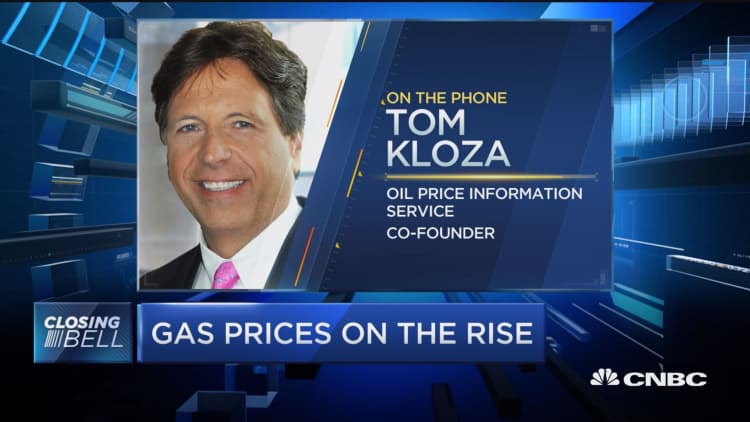High U.S. gasoline prices during the summer driving season may be a factor that keeps the White House from immediately reimposing sanctions on Iranian oil, analysts said.
President Donald Trump is expected to announce on Tuesday that the U.S. will withdraw from the deal made between Iran and six nations that was intended to end the Iranian nuclear program. That agreement was made in exchange for waiving financial sanctions on Iran and on its oil exports.
If the U.S. opts to leave the deal, analysts said the administration could announce a grace period before imposing sanctions.
Oil prices slumped ahead of the 2 p.m. ET announcement. West Texas Intermediate futures were down almost 3 percent and were trading at $68.59 per barrel. Gasoline futures were also down 2.4 percent, to $2.08 per gallon.
At the pump, gasoline prices are currently $2.81 per gallon of unleaded nationally, but there are already states with retail prices of $3 per gallon or higher. Memorial Day is typically the start of the summer driving season, and demand often peaks around the July 4th weekend. Prices often peak in June.
If Trump announces full sanctions on Iran, oil could jump $5 to $10, immediately, said John Kilduff of Again Capital. "Gasoline prices would spike right along with it," he said. "You're talking $4 gas."
To avoid that pain at the pump, Kilduff said he expects Trump to say the U.S. will withdraw from the deal but not impose sanctions.
But Helima Croft, global head of commodity strategy at RBC, said she expects the U.S. will just delay the sanctions, as happened when the Obama administration imposed them with a 180-day grace period.
"We expect we will probably have some grace period extending over the summer, in order to avoid pushing gas prices higher into the summer, but I don't think you appoint John Bolton as national security advisor if you're not willing to take a harder line on Iran.," Croft said.
Croft said the Trump administration could announce a grace period of 90 to 180 days.
"They are concerned about how you deal with a situation where the national average for gas prices is approaching $3 a gallon," Croft said. "This is a challenge for them as they approach the midterm elections."
However, Edward Morse, global head of commodities research at Citigroup, said he does not expect the Trump administration will put sanctions on Iran's oil, though the president could pull out of the deal.
"I think he's going to try to have his cake and eat it to. I think he's going to be strong on saying we're not going to waive sanctions, but we're not going to reimpose them," he said. "We're going to give the Europeans a longer period of time to improve the deal which means they take some sanctions on Iranian enterprises related to ballistic missiles and they've got to take action to stop spending on terrorism in their neighborhood."
Morse said it would unusual for an administration to put sanctions on Iran's oil heading into the summer driving season. He said the U.S. also does not appear to be moving diplomatically to disrupt Iranian oil sales, as the Obama administration had done with importing countries.
Analysts said the Trump administration, lacking the support of allies who still back the deal, would have a difficult time removing as much oil from the market as the original sanctions. They estimate about 300,000 to 500,000 barrels could be removed, about a third the level of the previous round of sanctions on Iran's oil exports.
Kilduff said he believes Trump is sensitive to higher gasoline prices, particularly after he slammed OPEC in a tweet last month for artificially high oil prices.
"If he comes out and says he's out of the deal, but if he wiggles on the imposition of sanctions, we might sell off," said Kilduff.



